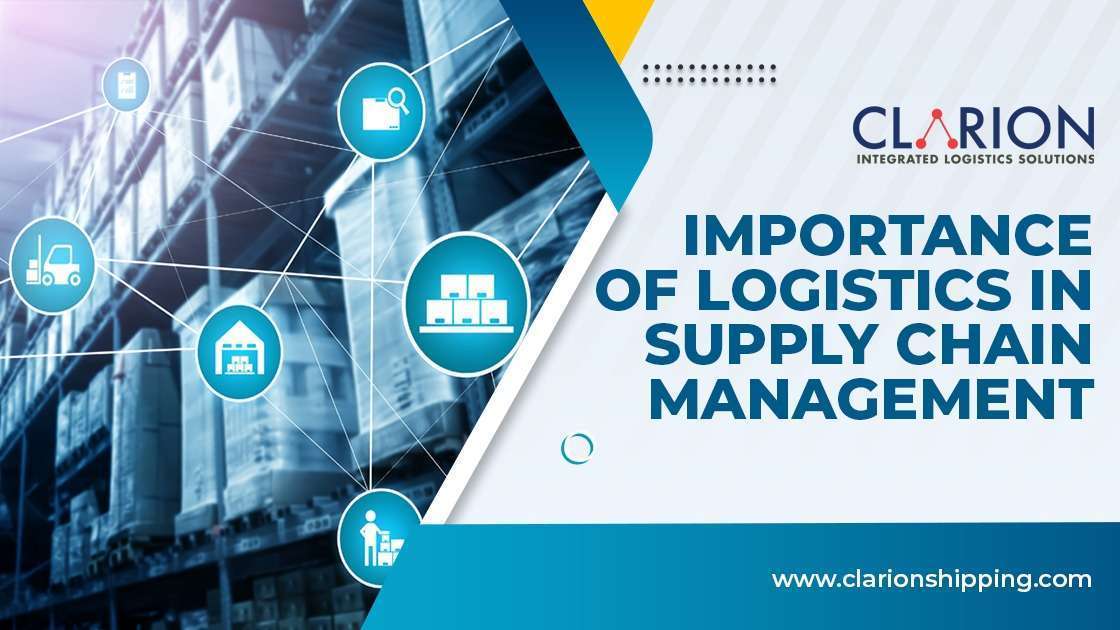
Importance of Logistics in Supply Chain Management
Supply chain management (SCM) and logistics are two interconnected terms that most people use interchangeably. But both complement each other and each one has their own definition and function. So, let’s start with defining the terms and their function.
Supply chain management operates a wide system that begins with finding raw materials and ends with delivering the goods to the final destination. This linear chain includes planning and forecasting, purchasing raw materials, inventory and assembly, warehousing, sales, delivery, and customer support. Whereas, logistics is the management of efficient transportation of goods from the point of origin to the final end to ensure timely delivery. Actually, logistics coordinates the entire process and facilitates the smooth running of the business. In short, logistics is one of the elements in the linear chain of supply chain.
A well-ordered and systematic logistics stand on the pillars of the 7 Rs. Those are:
- Right product
- Right quantity
- Right condition
- Right place
- Right time
- Right customer
- Right price
Ensuring these 7 Rs of logistics enhance the brand value and trustworthiness.
Segments of Logistics
Logistics is the physical demonstration of a transaction. Without it, there is no transfer of money from the buyer to the seller. Logistical practices and strategies rely on the type of business and products. Here are the main segments of logistics;
Sourcing materials:
Sourcing materials goes beyond simply locating the supplier with the lowest price for a raw material used in production. Logistics encompasses the assessment and control of various elements and expenses that contribute to the overall process, such as delays caused by backorders, competitor prioritization, and exclusions, additional service charges, unrelated fees, heightened shipping expenses due to distance or regulatory conditions, and warehousing costs. Successfully identifying the appropriate supplier for a specific material necessitates a comprehensive comprehension and effective management of all these factors. This undertaking is known as strategic sourcing, and logistics play a crucial part in its strategic planning.
Transportation:
The essence of logistics revolves around the process of physically moving goods from one location to another. Initially, a company must choose the most suitable method of transportation, such as air or land, and identify the optimal carrier based on factors like cost, speed, and distance. This includes optimizing routes that may involve multiple carriers. For international shipments, it is essential for the shipper to be knowledgeable about customs procedures, tariffs, compliance requirements, and any applicable regulations. Transportation managers are responsible for documenting and monitoring shipments, handling billing processes, and providing performance reports using dashboards and analytical tools. Clarion utilizes advanced technologies to streamline and simplify these processes, ensuring a hassle-free shipping experience.
Warehousing:
Warehousing encompasses the storage of goods for both short-term and long-term durations. An efficient warehouse should be equipped with temperature regulations to preserve the goods. Additionally, it should have docking facilities and easy accessibility to shipyards or rail lines.
Inventory management:
Strong inventory management helps the organization to take wiser decisions such as when should provide offers on goods, which are the products in high demand and which ones should be replaced, and even to track the growth of business in a particular country or region.
Order fulfillment:
The linear process is completed with order fulfillment. An item is tracked from the shelf and packed well according to receiving orders and shipped to the customer’s destination. Reverse logistics is also a part of order fulfillment.
Why Logistics is Important in Supply Chain Management?
- Transparency: Logistics enhance transparency or visibility of the entire supply chain and proffer the business more control over it. This transparent nature of logistics provides businesses with real-time data that helps them make the right decisions. Clarion shipping embeds advanced technology that offer better visibility and helps to detect and solve supply chain problems.
- Demand Estimation: The various technologies implemented in logistics management help the organization forecast demands, estimate the stock, decide the mode of transportation, and so on, which enables the organization to run efficiently and smoothly.
- Lower Operational Cost: An efficient logistics partner can design a well-thought-out logistics strategy that in turn reduces the operational cost. An intelligent logistics strategy can deduct the overheads from route planning to shipping methods, purchasing inventory, and even the amount of storage space required. Also, the strategic plan proffers preventive maintenance which prevents unexpected expenses in the future.
- Improved Customer Satisfaction: Timely delivery is a significant factor in logistics that drives more customers. In online shopping, before buying the item, customers check the delivery date. Timely delivery of the right item at the right place improves customer satisfaction that eventually causes getting more business.
In conclusion, the importance of logistics in the supply chain cannot be overstated. It serves as the vital link that connects suppliers, manufacturers, distributors, and customers, ensuring the smooth flow of goods and services. Effective logistics management optimizes operational efficiency, reduces costs, improves customer satisfaction, and drives overall business success.





